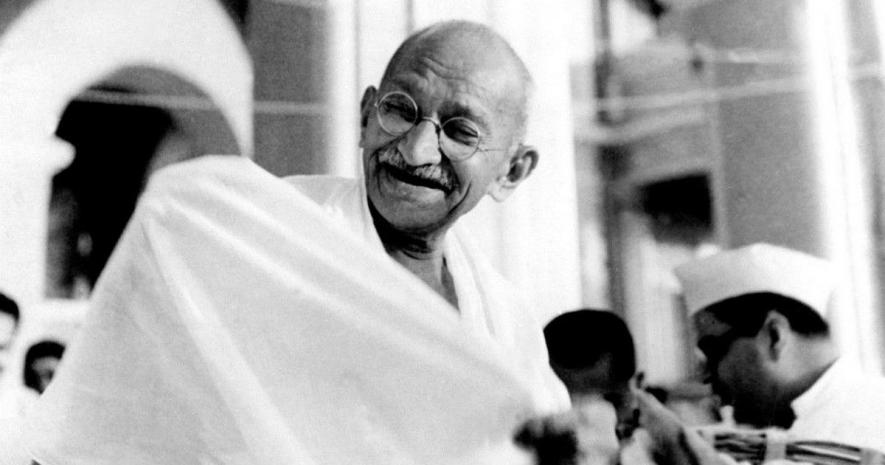Gandhi’s Economic Non-Violence in era of Change Without Progress

Image Courtesy: Wikimedia Commons
Mahatma Gandhi’s economic philosophy centred on principles like decentralisation, Gram Swaraj (self-sufficient village communities), and Sarvodaya (welfare of all). He envisioned an economic system where power and resources were decentralised, empowering local communities to manage their own affairs and promote self-sufficiency. Gandhi advocated for a sustainable and just economy that prioritised the welfare and uplift of every individual, with a strong emphasis on moral and ethical values. Reflecting his vision of a harmonious and equitable society, his ideas aimed to foster economic equity, social justice, and the well-being of all, rather than the pursuit of profit at the expense of others.
India’s significant wealth gap has the top 10% of the population control 77% of the national wealth, which, in 2017, meant that the top 1% controlled 73% of the new wealth while the bottom 50% saw an only 1% increase in their wealth. This extreme economic inequality reveals the failure of ‘trickle down’ economics and underscores the need for policies to address this issue. Sustainable economic growth seems unlikely with such disparities. Gandhi, although not a formal economist, raised moral and ethical concerns about economic models, highlighting their relevance in addressing the challenges that persist till today.
Gandhi’s concepts, introduced in the early 1900s, remain relevant today due to unaddressed challenges such as unemployment, poverty, limited access to education and healthcare, and exploitation of marginalised populations. However, it is essential that we acknowledge how the nature of these issues has changed since then. Economics, centred on the concept of scarcity, often seeks to address these disparities through increased production. Adam Smith’s idea of self-interest driving market efficiency is well known, but efficiency does not necessarily guarantee fairness or equity.
That is why Mahatma Gandhi advocated for simplifying one's desires as a means to alleviate scarcity. He aptly asserted that our resources are adequate to meet our needs, though not our insatiable wants. From an economic standpoint, this perspective entails utilising scarce resources to produce essential needs rather than focus on luxury commodities or aesthetic projects. For example, the Bombay Municipal Council or BMC plans to spend Rs 500 crore and the Gujarat government another Rs 150 crore on projects to beautify the Shivrajpur beach. This, while 38% of Gujarat’s population is undernourished as per the National Multidimensional Poverty Index.
Gandhi’s concerns about the profit-driven market structure of the modern age stem from a recognition of these disparities and anomalies. Capitalism gained prominence during the industrial revolution but contributed to economic inequality by concentrating wealth in the hands of a few capitalists, exploiting the labour of the working classes. This issue remains relevant in contemporary times, where large corporations, often with government support, exploit natural and human resources under the pretext of 'economic development’.
Promoting a localised and necessity-driven economy, often referred to as Gram Swaraj, as an alternative to market expansion driven by excess and greed, could potentially solve these challenges. Encouraging micro and small enterprises in rural and urban settings through incentives can serve multiple purposes. It would not only foster economic growth but assists policymakers in addressing migration and unemployment concerns. Furthermore, the presence of a local market has the added advantage of streamlining supply chains, reducing production costs and prices. This, in turn, would enhance accessibility to essential goods for the economically disadvantaged population.
Centralised policies are inadequate to address economic challenges that stem from the local areas, especially Indian villages. Embracing Gandhiji’s decentralisation principle can tackle these issues to reduce the inequalities of income and wealth. The 73rd and 74th amendments to the Constitution established local self-governance through Panchayati Raj Institutions (PRIs) and Urban Local Bodies (ULBs). These offer institutional frameworks meant exactly for this purpose—reducing inequality and providing opportunities for self-reliance.
However, most PRIs rely on grants from the central and state governments for they lack financial autonomy. Although State Finance Commissions exist to provide recommendations to state governments, there is no binding obligation for the latter to devolve funds accordingly.
The report of the Standing Committee on Rural Development and PRIs, presented in the Lok Sabha on March 14 last year, highlights the widespread failure of nearly all states in establishing institutional structures to take care of their urgent economic needs. States were supposed to establish their (sixth) State Finance Commissions to function from 2021-22 to 2026-27. Nevertheless, a number of states, including Gujarat, Jharkhand, and Goa, have yet to establish even their fourth finance commissions! So far, Arunachal Pradesh has only formed two such commissions!
Achieving fair wages for all labour was seen as a path to self-sufficiency and a reduction in economic injustices. Burning foreign-made clothing symbolised the resistance to the exploitation of Indian workers, while the Charkha represented self-rule and economic independence through self-sufficiency in homespun textiles and clothing. Gandhi’s stance on machinery was not of a Luddite opposed to technology in general but against machines that displaced human labour. The Charkha, in contrast, complemented human effort. His Sarvodaya philosophy, inspired by John Ruskin, emphasised equality and justice over utilitarianism, advocating for a production model driven by the masses to promote the well-being of all.
Gandhi posited that economic violence, largely a consequence of market dynamics, could be mitigated through the promotion of harmony across every economic activity. One method to achieve this harmony involved ensuring that workers received wages that enable a decent standard of living. He cautioned against the business practices of major corporations that wield substantial control over wealth and income, underscoring the need for vigilance in regulating such entities.
According to one estimation, during the 2009-10 period, approximately 15% of employees on fixed salaries and 41% in casual employment received earnings lower than the suggested national minimum wage. The incomes of 33% of wage-earning individuals, which adds up to 6.2 crore workers, were below the recommended national minimum wage during that time frame. Data from the Periodic Labour Force Survey 2017-18, shows that 45% of employees classified as regular workers (those engaged in relatively stable formal employment) received income below the minimum wage.
Gandhiji’s concept of non-violence encompasses more than just physical violence and includes addressing economic inequality and worker exploitation. He advocated for capitalists to act as trustees, utilising their wealth for the common good rather than personal gain. In essence, he strongly opposed certain fundamental economic principles and emphasised the significance of moral values in economics. While economists may not universally endorse Gandhian ideas, they can still draw inspiration for framing welfare policies with a similar moral focus.
The author is assistant professor at the Department of Economics, St. Xavier’s College (Autonomous), Ahmedabad. The views expressed are personal.
Get the latest reports & analysis with people's perspective on Protests, movements & deep analytical videos, discussions of the current affairs in your Telegram app. Subscribe to NewsClick's Telegram channel & get Real-Time updates on stories, as they get published on our website.
























